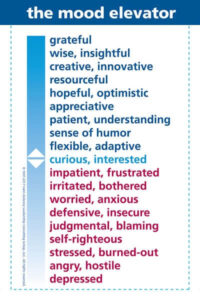What does a good mood (or worse — a bad one) have to do with company culture?
A lot, according to Larry Senn, author of “The Mood Elevator: Take Charge of Your Feelings, Be a Better You” and the undisputed “Father of Corporate Culture.” Many years ago, his doctoral dissertation was the world’s first study of corporate culture. During a recent #WorkTrends event, our guest host Shawn Murphy asked Larry why mood matters, and how leaders can really lead major cultural change.
Leaders’ Moods Matter
The central finding of Larry’s research was that organizations tend to become shadows of their leaders. “Anybody who is a parent or a leader has a great obligation for how they show up each day.”
In other words, if the boss comes into the room in a bad mood, she can sink the meeting — fast.
Living at the Top of the Mood Elevator
Larry explains that we all ride “the mood elevator” every day. At the top are positive traits such as gratitude, resourcefulness, curiosity and purpose. At the bottom is depression. In between are the various moods that strike us all day.

Source: themoodelevator.com
His work has focused on helping people spend more of their time being at their best, at the top of the mood elevator, and limiting the damage they do when they’re feeling down.
“Have you ever said something to a loved one you wish you could take back? Have you ever written an email you shouldn’t have written? Well, I guarantee you were in the lower levels, below the midpoint, on the mood elevator,” he says.
When we learn to spend more time on the upper levels, and do less damage to ourselves and others while on the lower levels, we can have a better life, better relationships, a better marriage — the list goes on.
In other words: “Take control of your emotions and be a better you,” he says.
Real-Word Examples: How Organizations Use the Mood Elevator to Shape Culture
Larry co-founded the culture-shaping firm Senn Delaney, which uses concepts like the mood elevator to improve corporate culture. He points to several examples of organizations that are at the top of their game because of these simple concepts.
“We have one hospital that has the highest patient satisfaction and highest engagement scores in America. They have a 6-foot wall with the mood elevator on it in the nursing station. The nurses put their tongue depressors on where they are when they come in,” he says.
Another example he shares: “Victoria’s Secret is the most renowned retailer in the world. You go in the back room of a Victoria’s Secret store and they’ve got a mood elevator on their wall. It’s a very practical thing. It’s one of the many things at Senn Delaney we teach, but it is a powerful notion and tool in life.”
Aim for Curiosity, Not Judgment
If you’re looking for an easy way to reframe your mood, try this quick tweak that has major results: Aim for curiosity, not judgment.
“Let’s say someone you know does something that you don’t like or doesn’t make sense to you,” Larry says. “You’ve got a choice: You can go to judgment, you can go to anger, or you can go to curiosity and say, ‘Huh? I wonder how they see this?’”
“We make things up and we create these stories in our head, and what we great teams are able to do is they assume positive intention. They assume that everybody on the team really does want to get a good outcome. They may have different ways of doing, they may not agree with them, but don’t assume that they have negative motives. Start from the assumption of positive intention and be curious to figure out why they see it that way.”
Another way to think of curiosity versus judgment: Work toward a “growth mindset.” Larry points to Carol Dwick, who offers some fascinating work in the area of growth mindset in her book “Mindset.” She says that people tend to either have a fixed mindset or a growth mindset.
“Today, more than any other time in history, we need to have a growth mindset in organizations to have agility and innovation,” he says. “The essence of a growth mindset is living in curiosity — being okay not knowing, asking questions, not being the expert, but just to wonder about things.”
“If you can just live life more in curiosity than judgment, you’ll have a totally different life,” Larry says.
Stay tuned for more inspiration on the #WorkTrends podcast, every Wednesday: http://bit.ly/2DjCkja.